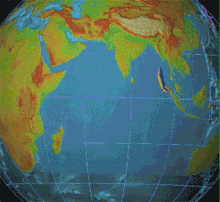
Back Seismologie Afrikaans علم الزلازل Arabic Sismoloxía AST Seysmologiya Azerbaijani Sismolohiya BCL Сейсмалогія Byelorussian Сэйсмалёгія BE-X-OLD Сеизмология Bulgarian ভূকম্পবিজ্ঞান Bengali/Bangla Seismologiezh Breton

| Part of a series on |
| Earthquakes |
|---|
 |
Seismology (/saɪzˈmɒlədʒi, saɪs-/; from Ancient Greek σεισμός (seismós) meaning "earthquake" and -λογία (-logía) meaning "study of") is the scientific study of earthquakes (or generally, quakes) and the generation and propagation of elastic waves through the Earth or other planetary bodies. It also includes studies of earthquake environmental effects such as tsunamis as well as diverse seismic sources such as volcanic, tectonic, glacial, fluvial, oceanic microseism, atmospheric, and artificial processes such as explosions and human activities. A related field that uses geology to infer information regarding past earthquakes is paleoseismology. A recording of Earth motion as a function of time, created by a seismograph is called a seismogram. A seismologist is a scientist works in basic or applied seismology.
© MMXXIII Rich X Search. We shall prevail. All rights reserved. Rich X Search